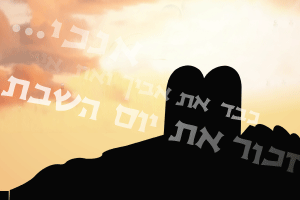Mitzvos before Matan Torah
| May 23, 2012 We begin by noting that there are indications in the Written Torah that at least some commandments were observed in pre-Torah generations. Consider the mitzvah of yibum or levirate marriage. The Torah relates that when Yehudah’s son Eir died Yehudah instructed Eir’s brother Onan to marry the widow. In describing this event the Torah uses the word yibum that later appears in the Torah as a commandment. Ramban writes that the sages of those times were aware of the enormous spiritual benefit of levirate marriage. He describes this practice as a custom (minhag). Others write that levirate marriage is one of the commandments that were incumbent on Noachides before the Torah was given.
We begin by noting that there are indications in the Written Torah that at least some commandments were observed in pre-Torah generations. Consider the mitzvah of yibum or levirate marriage. The Torah relates that when Yehudah’s son Eir died Yehudah instructed Eir’s brother Onan to marry the widow. In describing this event the Torah uses the word yibum that later appears in the Torah as a commandment. Ramban writes that the sages of those times were aware of the enormous spiritual benefit of levirate marriage. He describes this practice as a custom (minhag). Others write that levirate marriage is one of the commandments that were incumbent on Noachides before the Torah was given.
The Talmud states that Avraham observed the Torah as alluded to in Hashem’s statement that Avraham observed “My safeguards My commandments My decrees and My Torahs.” With respect to Yaakov too the Sages state that he observed the entire Torah as hinted to in the phrase “I dwelled with Laban” (Bereishis 32:5) with the Hebrew word for “dwelled” (גרתי) forming an anagram of 613 (תרי"ג) that evokes the 613 commandments. Virtaully all commentators accept that Yitzchak also observed the commandments. On this basis they question certain acts of Yitzchak that seem to have violated Torah law such as partaking of meat that was slaughtered by his son Esau who was an apostate and thus unfit to perform kosher slaughter.
We further find that the principle of Torah observance is extended to the Matriarchs of the Jewish people. For example the Torah relates that after the birth of Yitzchak Sarah rejoiced in becoming able to once again nurse children. The Sages prompted by the Torah’s use of the plural form children as opposed to child explain that there were skeptics who scoffed at the claim that the aged Sarah had given birth to Yitzchak. To prove them wrong Sarah nursed other women’s babies who were present at the celebratory feast when Yitzchak was weaned. Several commentators note that this is an apparent violation of the halachah forbidding a Jewish woman to nurse gentile children. This question presupposes that Sarah observed the commandments of the Torah.
We find as well that Yaakov’s sons are presumed to have observed Torah law. Thus the Torah states that in preparation for Yosef’s meal with his brothers he instructed that an animal be slaughtered and the Gemara explains that Yosef instructed that his brothers be shown that the slaughter was done in keeping with halachah. Between the generation of Yosef and the giving of the Torah we find that the classical authorities question the propriety of the marriage of Moshe’s father Amram to his aunt Yocheved indicating a presumption that Amram observed the Torah.
The classical commentaries also discuss the Torah observance of a number of people who were outside the line of descent stretching from Avraham to Moshe. For example they question whether Adam and Malkitzedek observed the Torah. Interestingly we find statements in the commentaries clarifying who did not observe the Torah. Thus at least one commentator argues that Lot Avraham’s nephew did not observe the commandments.
In summary there is a consensus among commentators that from the time of Avraham until the Torah was given there was at least a small core of people within the Jewish nation who observed the commandments. Mishneh LaMelech writes that it consisted of the Avos Yaakov’s sons and perhaps Eliezer Avraham’s servant while the Netziv writes that it consisted of the leaders of the nation but that the masses did not observe the commandments. At any rate it seems that the principle of Torah observance applies at least to Avraham and Sarah; Yitzchak and Rivkah; Yaakov Leah and Rochel; Yaakov’s sons; and Amram.
Still it must be stressed that consensus is not the same as unanimity. Thus there are commentators who argue that only the Avos — Avraham Yitzchak and Yaakov — observed the Torah and yet others go so far as to say that only Avraham observed the entirety of the Torah.
Oops! We could not locate your form.
